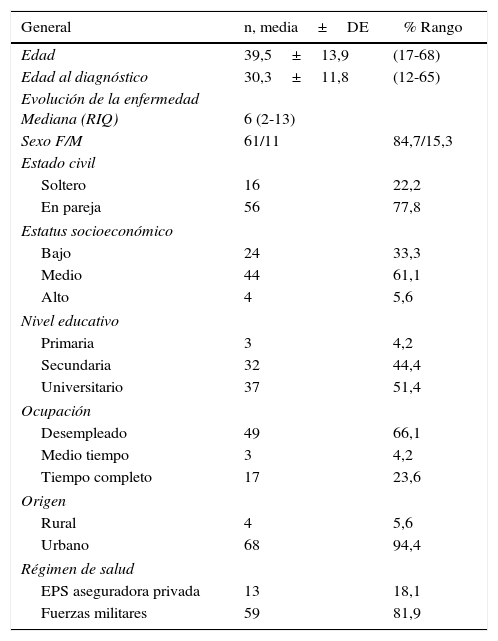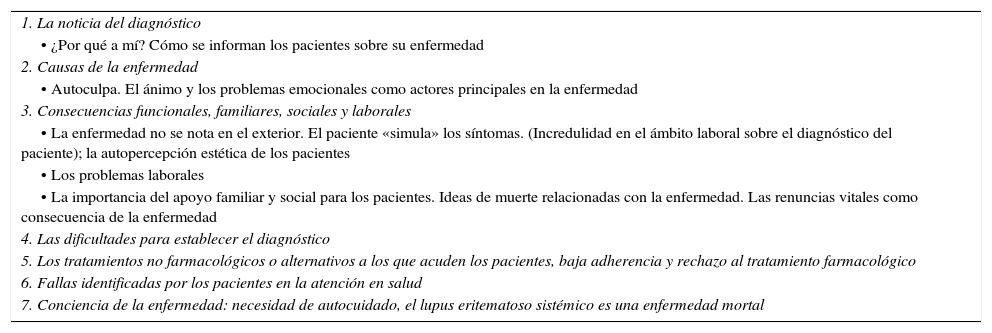El lupus eritematoso sistémico (LES) es una enfermedad crónica que expone a los pacientes a situaciones estresantes físicas, psíquicas, familiares, laborales y sociales. Se conoce que la calidad de vida relacionada con la salud de estos pacientes es inferior a la de la población general y que el estrés está relacionado con el empeoramiento del LES. El estudio de los factores que determinan la percepción del paciente con LES permitiría conocer los mecanismos que inciden negativamente en la calidad de vida y promover intervenciones que conlleven su mejoría.
ObjetivoConocer la percepción que los pacientes con LES tienen acerca de su enfermedad.
MetodologíaCincuenta pacientes (11 hombres) con LES y sin otras enfermedades autoinmunes participaron en 5 grupos focales, realizados por un médico psiquiatra mediante la aplicación de entrevista semiestructurada. Utilizando la teoría fundamentada, las transcripciones fueron categorizadas en 3 fases: codificación abierta, axial y selectiva.
ResultadosSe organizaron en 7 categorías: noticia del diagnóstico; causas de la enfermedad; consecuencias funcionales, sociales y laborales; dificultades para establecer el diagnóstico; los tratamientos no farmacológicos o alternativos; baja adherencia y rechazo al tratamiento farmacológico; fallas identificadas por los pacientes en la atención en salud y conciencia de la enfermedad.
ConclusionesEl conocer la percepción que tiene el paciente con LES de su enfermedad les permite al médico, al paciente y a su familia adoptar medidas encaminadas a diseñar intervenciones puntuales y eficaces para el manejo integral, adherencia al tratamiento, disminución de morbilidad asociada y de costos derivados de la atención médica.
Systemic lupus erythematosus (SLE) exposes patients to physical, psychological, family, work and social stress factors. The health-related quality of life of these patients is less than that of the general population, and stress is associated with worsening symptoms of SLE. Studying the factors that determine the perceptions of an SLE patient toward their disease would allow understanding the mechanisms by which quality of life is adversely affected, and promote interventions that ensure the well-being of these patients.
ObjectiveTo gain knowledge of the perceptions that SLE patients have regarding their disease.
MethodologyA total of 50 patients (11 of them men) participated in 5 focus groups that were guided by a psychiatrist applying a semi-structured interview. The interview transcripts were categorised into the following 3 phases using grounded theory: open, axial and selective coding.
ResultsThe results were organised into 7 categories: news of the diagnosis; causes of the disease; functional, social and work consequences; difficulties in establishing a diagnosis; non-pharmacological, alternative treatments, low or non-adherence and rejection of drug treatment; weaknesses in health care identified by the patient; and disease awareness.
ConclusionsKnowing the perception that SLE patients have of their disease allows the physician, the patient, and the patient's family to take steps toward designing timely and effective interventions for integrated disease management, treatment adherence, and reducing the associated morbidity and costs of medical care.
Artículo
Comprando el artículo el PDF del mismo podrá ser descargado
Precio 19,34 €
Comprar ahora







